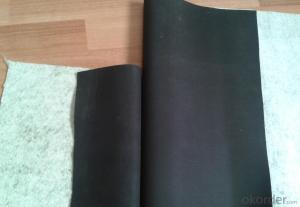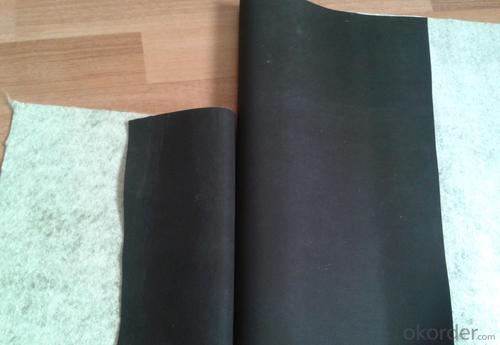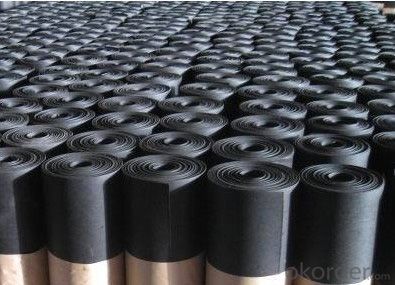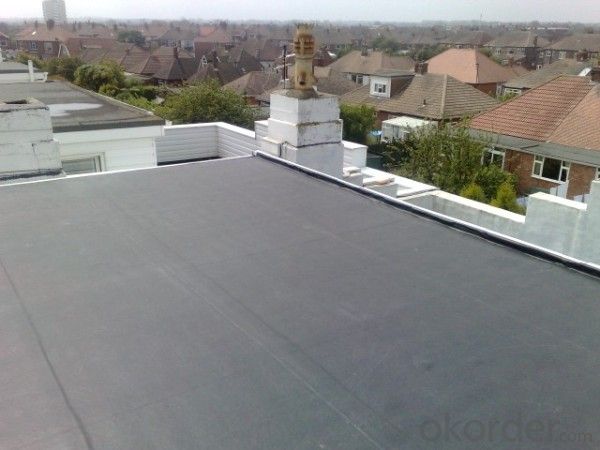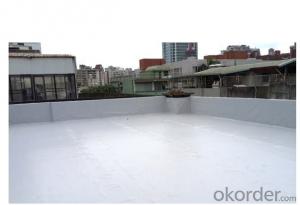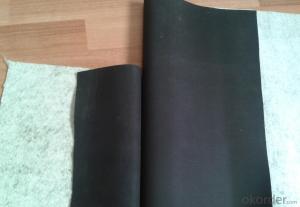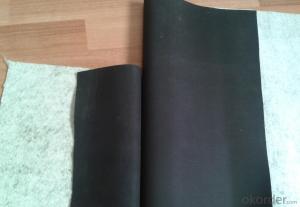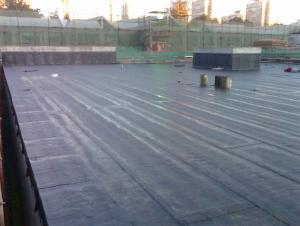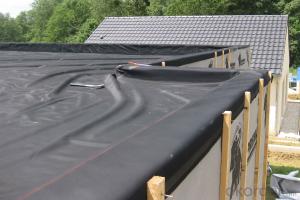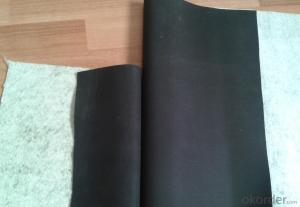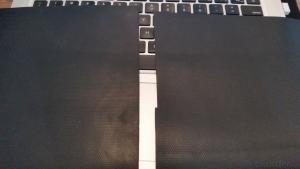EPDM Waterproofing Membrane with Fleeced Back
- Loading Port:
- Shanghai
- Payment Terms:
- TT OR LC
- Min Order Qty:
- 50000 m²
- Supply Capability:
- 5000000 m²/month
OKorder Service Pledge
OKorder Financial Service
You Might Also Like
EPDM Waterproofing Membrane with Fleeced Back
Description Of EPDM Waterproofing Membrane with Fleeced Back:
This waterproof coiled material is of high elasticity with best performance among high polymer waterproof coiled material in the world.It is also the most typical one in the world.Waterproof coiled material made of ternary ethylenepropylene rubber of KINTOPbrand is produced with the use of the most advanced continuous extrusion and vulcanization technology and related equipments which are specially designed for production of such product.It is good in compactness,without bubble and performance difference in length and breadth.
Main Features of EPDM Waterproofing Membrane with Fleeced Back:
1>Excellent anti-aging performance, service life up to 50 years
2>Working well with in -40°C to 100°C,it can be constructed with a single layer in ambient temperature.
3>Waterproofing on various kinds of underground project,industrial of civil buildings and structures.
4>high extension rate, high tensile strength, small size changes at heat treatment
5>Good plant roots penetrability resistance and can be made waterproofing layer of planting roof
6>Special modified molecular structure ,effectively resolving the current domestic and foreign glue
joint problem .
7>Good low temperature flexibility, and good performance of adapting to ambient temperature
changes.
8>Convenient application ,solid joint, no environment pollution
9>chemical corrosion Resistance, can be used for special occasions
Specifications of EPDM Waterproofing Membrane with Fleeced Back:
Type | EPDM Rubber Waterproof Membrane | ||
Type | Vulcanized and Weldable | ||
Thickness | 1.2mm | 1.5mm | 2.0mm |
Weight(kg/m2) | 1.54-1.58 | 1.79-1.83 | 2.25-2.29 |
Size | 1.2m (width) * 20m (length)/roll. Weldable type could be 4m wide. | ||
Packing | 24㎡/roll, with plastic bag. (Weldable: 80㎡/roll) | ||
Usage | Roof, basement, pond, Lake, steel structure roofing, underground, tunnel, etc | ||
NO. | Item | Unit | Technical requirement | |
1 | Tolerance on size | Thickness | % | ±10 |
Width | % | ±1 | ||
length | % | Does not allow negative | ||
2 | Fracture tensile strength (normal temperature ) | Mpa | ≥7.5 | |
Fracture tensile strength(60 ℃) | Mpa | ≥2.3 | ||
3 | Breaking elongation,(normal temperature ) | % | ≥450 | |
Breaking elongation,(-20 ℃) | % | ≥200 | ||
4 | Tearing resistance | KN/m | ≥25 | |
5 | Impermeability | * | 0.3Mpa impermeable | |
6 | Bending at low temperature | °C | ≤-40 | |
7 | Elongation and contraction volume at heating | Elongation | mm | ≤2 |
contraction | mm | ≤4 | ||
8 | Hot air aging 80°CX168h | Fracture strength retention | % | ≥80 |
Rate of elongation at break | % | ≥70 | ||
9 | Alkaline (saturated Ca(OH)2 solution normal Temperature x2 168h ) | Fracture strength retention | % | ≥80 |
Rate of elongation at break | % | ≥80 | ||
10 | Ozone aging (40 degree by 168 hours ) | Elongation 40% , 500x10-2 | * | No Crack |
11 | Phytotron aging | Fracture strength retention | % | ≥80 |
Rate of elongation at break | % | ≥70 | ||
Applications of EPDM Waterproofing Membrane with Fleeced Back:
Widely used in roofs, basement, toilet ,swimming pool, and all kinds of industry and civil building waterproofing, reservoir, vivicism, bridge, underground, tunnel and dam waterproofing ,especially to the keystone waterproofing projects which is durability, high corrosion resistance and easy deformation.
Construction Site of EPDM Waterproofing Membrane with Fleeced Back:
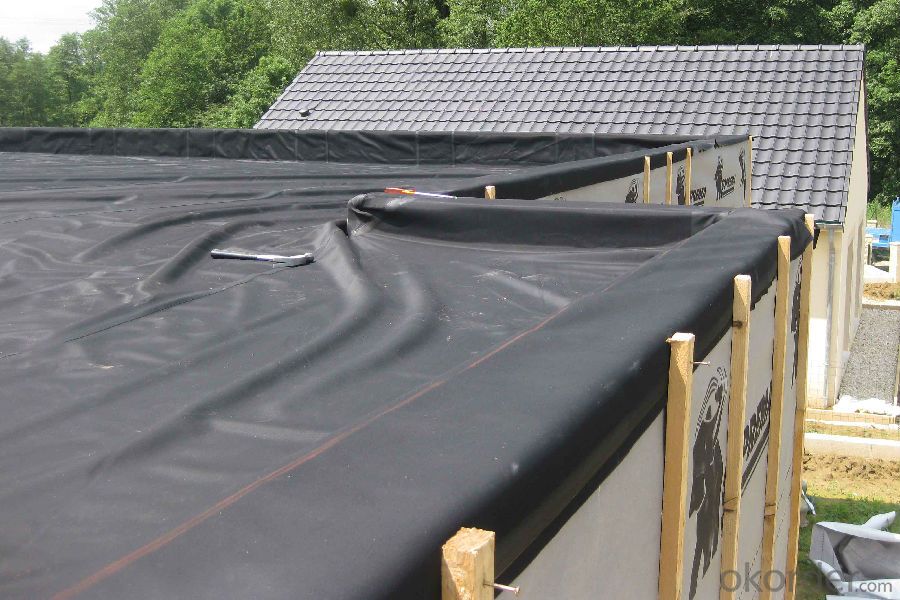
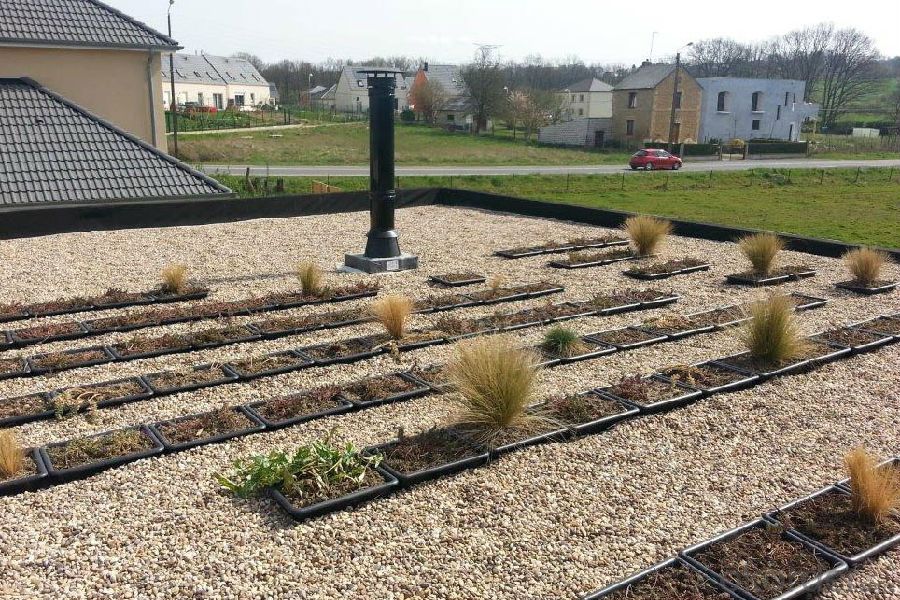
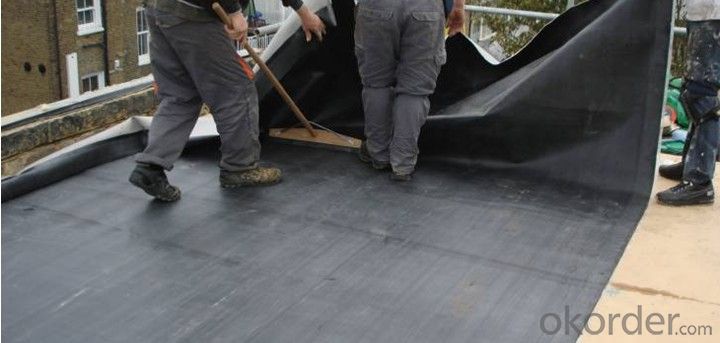
IMages of EPDM Waterproofing Membrane with Fleeced Back:
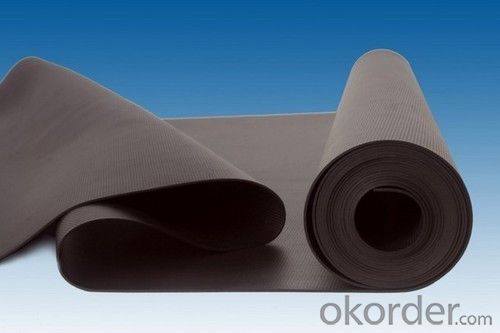
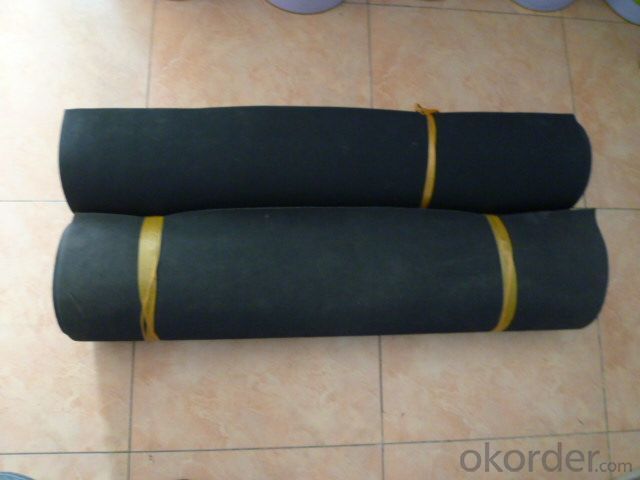
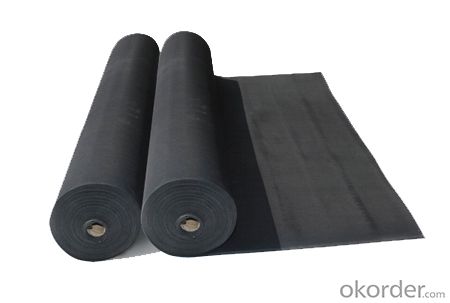
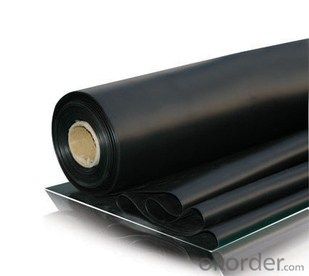
FAQ of EPDM Waterproofing Membrane with Fleeced Back:
1. What are we supplying?
We are specialized in producing Colorful Asphalt Roof Shingle, SBS/APP modified bitumen waterproof membrane, Self adhesive bitumen waterproof membrane, PVC waterproofing membrane, EPDM rubber roofing membrane, Single Component Polyurethane Waterproof Coating, and Spray Polyurea Waterproof Coating
.
2. How Many years experience do we have?
We have been exported to more than 20 countries in the past 15 years.
3. How long do we usually reply your request?
We always reply our customer within 24 hours.
- Q: Can a waterproofing membrane be used on brick surfaces?
- Indeed, brick surfaces can benefit from the application of a waterproofing membrane. These membranes have been specifically designed to create a barrier that effectively stops water from infiltrating. Notably, they have the versatility to be applied on various surfaces, including brick. By applying a waterproofing membrane to a brick surface, the risk of water damage is significantly reduced. This means that issues such as moisture seepage, which can lead to brick deterioration or the growth of mold, can be prevented. To ensure optimal results, it is crucial to select a waterproofing membrane that is compatible with brick and to closely adhere to the manufacturer's instructions during application. Seeking professional guidance is also advisable in order to choose and apply the most suitable membrane based on the specific requirements and conditions of the brick surface.
- Q: Can a waterproofing membrane be used in conjunction with fire protection systems?
- Yes, a waterproofing membrane can be used in conjunction with fire protection systems. While the primary function of a waterproofing membrane is to prevent water penetration, it can also act as a barrier to protect against fire. Some waterproofing membranes have fire-resistant properties, allowing them to withstand high temperatures and prevent the spread of fire. However, it is essential to ensure that the specific waterproofing membrane chosen is compatible and approved for use with the fire protection system in question.
- Q: Can a waterproofing membrane be used for underground utilities?
- Yes, a waterproofing membrane can be used for underground utilities. It provides a protective barrier against water infiltration, preventing potential damage or deterioration to the utilities.
- Q: Are waterproofing membranes resistant to thermal cycling?
- Yes, waterproofing membranes are generally resistant to thermal cycling. These membranes are designed to handle the expansion and contraction that occurs due to temperature fluctuations, making them ideal for protecting structures from water damage caused by thermal stress.
- Q: Can a waterproofing membrane be used in areas with chemical exposure, such as industrial settings?
- In industrial settings, a waterproofing membrane can indeed be utilized even in areas where chemical exposure is a concern. However, it is vital to carefully consider the compatibility of the chosen waterproofing membrane with the chemicals that are present. Different membranes possess varying degrees of resistance to different chemicals, hence the utmost importance of selecting a membrane that can endure the specific chemical exposure in the industrial setting. Furthermore, ensuring the proper installation and maintenance of the waterproofing membrane is crucial in order to guarantee its effectiveness and longevity in such environments. Regular inspections must be carried out, and any damage caused by chemical exposure should be promptly addressed through repairs or replacements. Ultimately, by making the right choice and consistently maintaining it, a waterproofing membrane can serve as an effective barrier against water and chemicals in industrial settings.
- Q: Can a waterproofing membrane be used on concrete block walls?
- Yes, a waterproofing membrane can be used on concrete block walls. It helps to prevent water penetration and protect the walls from moisture damage.
- Q: Can a waterproofing membrane be used in shower pans?
- Yes, a waterproofing membrane can be used in shower pans. In fact, it is highly recommended to use a waterproofing membrane in shower pans to prevent any water leakage or damage to the underlying structure. A waterproofing membrane acts as a barrier, preventing water from seeping through the shower pan and into the subfloor or surrounding walls. This helps to maintain the integrity and longevity of the shower pan and the overall shower system. Additionally, a waterproofing membrane can also protect against mold and mildew growth, ensuring a safe and hygienic environment. Therefore, using a waterproofing membrane in shower pans is an essential step in ensuring a durable and water-resistant shower installation.
- Q: Is a waterproofing membrane compatible with different types of flooring materials?
- Different types of flooring materials can be used with a waterproofing membrane. The purpose of a waterproofing membrane is to create a barrier between the subfloor and the flooring material, preventing moisture from causing any damage. This means that it can be used with laminate, vinyl, tile, and even hardwood flooring. By using a waterproofing membrane, the flooring material will remain protected from water damage, allowing it to last longer and maintain its appearance. However, it is important to keep in mind that specific compatibility requirements may exist for different types of waterproofing membranes. Therefore, it is advisable to consult the manufacturer's guidelines to ensure the proper installation of the chosen flooring material.
- Q: How does a waterproofing membrane handle expansion and contraction of a surface?
- A waterproofing membrane is specifically designed to accommodate the expansion and contraction of a surface. It is composed of flexible materials that can stretch and contract without compromising its integrity. This allows the membrane to move with the surface, preventing any cracks or damage that could lead to water infiltration. The membrane is typically installed with overlapping seams, creating a continuous barrier that can expand and contract as needed. These seams are often reinforced to provide additional strength and durability. Furthermore, the membrane is usually applied in multiple layers, which adds to its flexibility and ability to handle surface movement. In addition to the material composition, the installation process is crucial in ensuring the membrane can handle expansion and contraction. Properly trained professionals will consider the specific conditions of the surface, such as temperature fluctuations and structural movement, and install the membrane accordingly. They may use techniques such as hot-air welding or adhesive bonding to create a secure and flexible bond between the membrane and the surface. Overall, a waterproofing membrane is designed to accommodate the natural expansion and contraction of a surface. Its flexibility, reinforced seams, and multi-layer construction allow it to move with the surface without compromising its waterproofing capabilities, ensuring long-term protection against water infiltration.
- Q: Are there any special tools required for installing a waterproofing membrane?
- Installing a waterproofing membrane necessitates the use of various specialized tools. The specific tools required can differ depending on the type of membrane being installed, though some commonly used tools include a trowel or brush to apply the membrane, a utility knife to cut the membrane to the appropriate size, a roller for ensuring proper adhesion, and a heat gun to activate any adhesive properties of the membrane. In addition, other tools such as a measuring tape, level, and caulking gun may be required to ensure accurate installation. To guarantee that the correct tools are utilized for the specific membrane being installed, it is essential to refer to the manufacturer's instructions and recommendations.
Send your message to us
EPDM Waterproofing Membrane with Fleeced Back
- Loading Port:
- Shanghai
- Payment Terms:
- TT OR LC
- Min Order Qty:
- 50000 m²
- Supply Capability:
- 5000000 m²/month
OKorder Service Pledge
OKorder Financial Service
Similar products
Hot products
Hot Searches
Related keywords
